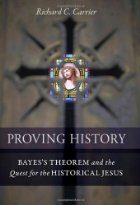 Till now I’ve always been more curious than persuaded about Carrier’s application of Bayes’s Theorem to what he calls historical questions, so curiosity led me to purchase his book in which he discusses it all in depth, Proving History: Bayes’s Theorem and the Quest for the Historical Jesus.
Till now I’ve always been more curious than persuaded about Carrier’s application of Bayes’s Theorem to what he calls historical questions, so curiosity led me to purchase his book in which he discusses it all in depth, Proving History: Bayes’s Theorem and the Quest for the Historical Jesus.
Before I discuss here his preface and opening chapter I should be up front with my reasons for having some reservations about Carrier’s promotion of Bayes’ theorem. (Allow me my preference for Bayes’ over Bayes’s.) I should also say that I’d like to think I am quite prepared to be persuaded that my resistance is a symptom of being too narrow-minded.
My first problem with Carrier’s use of the theorem arises the moment he speaks of it being used to “prove history” or resolve “historical problems”. For me, history is not something to be “proved”. History is a quest for explanations of what we know has happened in the past. Historical problems, to my thinking, are problems having to do with how to interpret and understand what we know has happened in the past. The milestone philosophers of the nature of history — von Ranke, Collingwood, Carr, Elton, White — have certainly spoken about history this way.
I have always understood that where there is insufficient data available then history cannot be done at all. Ancient history, therefore, does not allow for the same sorts of in-depth historical studies as are available to the historian of more recent times. Historical questions are necessarily shaped (or stymied altogether) by the nature and limitations of the available sources.
Criteriology (I take the term from Scot McKnight‘s discussion of the historical methods of biblical scholars in Jesus and His Death) has always looked to me like a fallacious attempt to get around the problem of having insufficient data to yield any substantive answers to questions we would like to ask. We don’t know what happened? Okay, let’s apply various criteria to our texts to see if we can find out what “very probably really did happen”.
Carrier’s introduction of Bayes’ theorem has always appeared to me to be an attempt to salvage some value from a fundamentally flawed approach to “history” — the striving to find enough facts or data with which to begin to do history.
I should add that I do like Carrier’s offering of hope that Bayes’ theorem can promote more rigorous and valid thinking and applications of criteria. But I can’t help but wonder if in the end the exercise is an attempt to patch holes in the Titanic with admittedly very good quality adhesive tape.
What is really accomplished if we find only a 1% probability for the historicity of Jesus? Improbable things really do happen in the world. Otherwise we would never know chance and always be living with certainty. Or maybe I’m overlooking something about Carrier’s argument here.
Not that I’m a nihilist. I do believe we have lots of useful evidence to assist us with the study of Christian origins. I think scholars are agreed that pretty much all of that evidence speaks about a Christ of faith (a literary figure) and not an historical figure. That’s where our historical enquiry must begin — with the evidence we do have. After we analyse it all and frame such questions as this sort of evidence will allow us to ask then we can begin to seek explanations for Christian origins. This will probably mean that we will find answers that do not address the life and personality of someone who is hidden from view. Our understanding will address religious developments, ideas, culture, literature, social developments. We will probably be forced to conclude — as indeed some historians do — that if there is an historical Jesus in there somewhere he is irrelevant to our enquiry.
So that is where I am coming from.
Let’s see if I am being too narrow-minded. Here is my reading of Carrier’s preface and opening chapter. Continue reading “Richard Carrier’s “Proving History: Bayes’s Theorem and the Quest for the Historical Jesus” Chapter 1 (A Review)”
